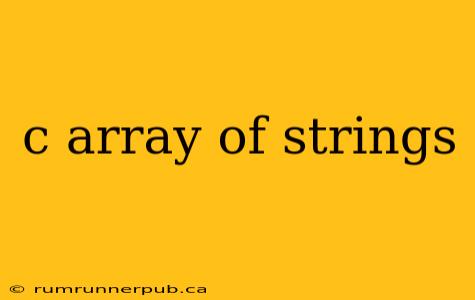Working with arrays of strings in C can be tricky, but it's a fundamental skill for any C programmer. This article will explore common challenges and solutions, drawing upon wisdom from Stack Overflow, adding context, and providing practical examples.
Understanding the Basics: Arrays of Character Pointers
In C, a "string" is essentially a null-terminated array of characters (char). An array of strings is therefore an array where each element is a pointer to a char array (a string). This is a crucial distinction. Let's illustrate with an example, and then delve into some common Stack Overflow questions and answers.
#include <stdio.h>
int main() {
char *strings[] = {"Hello", "World", "from", "StackOverflow"};
int numStrings = sizeof(strings) / sizeof(strings[0]);
for (int i = 0; i < numStrings; i++) {
printf("%s ", strings[i]);
}
printf("\n");
return 0;
}
This code declares an array of strings. strings is an array of char*, meaning each element points to a string literal stored in memory.
Stack Overflow Q&A 1: Memory Allocation and Initialization (inspired by numerous SO questions)
Problem: How do I dynamically allocate an array of strings? How do I initialize it?
Many Stack Overflow questions address the complexities of dynamically allocating arrays of strings. This requires allocating memory for both the array of pointers and the strings themselves.
Solution:
#include <stdio.h>
#include <stdlib.h>
#include <string.h>
int main() {
int numStrings = 3;
char **strings = (char **)malloc(numStrings * sizeof(char *)); // Allocate array of pointers
if (strings == NULL) {
fprintf(stderr, "Memory allocation failed\n");
return 1;
}
for (int i = 0; i < numStrings; i++) {
strings[i] = (char *)malloc(50 * sizeof(char)); //Allocate memory for each string. Adjust 50 as needed.
if (strings[i] == NULL){
fprintf(stderr, "Memory allocation failed\n");
//Clean up already allocated memory before exiting.
for(int j=0; j<i; j++) free(strings[j]);
free(strings);
return 1;
}
printf("Enter string %d: ", i + 1);
fgets(strings[i], 50, stdin); //Using fgets to prevent buffer overflow
strings[i][strcspn(strings[i], "\n")] = 0; //Remove trailing newline from fgets.
}
// ... use strings ...
// Remember to free the allocated memory!
for (int i = 0; i < numStrings; i++) {
free(strings[i]);
}
free(strings);
return 0;
}
Analysis: This code first allocates an array of char* pointers. Then, it iterates through the array, allocating memory for each string using malloc. Crucially, it includes error checking to handle potential memory allocation failures. Always remember to free the dynamically allocated memory using free() to prevent memory leaks. We are also using fgets() to safely read input preventing potential buffer overflow problems.
Stack Overflow Q&A 2: Two-Dimensional Arrays (inspired by numerous SO questions)
Problem: Are 2D arrays a better alternative?
While you can use 2D arrays, they have limitations. A 2D array like char strings[10][50]; has a fixed size (10 strings, each with a maximum length of 49 characters). Dynamically resizing is not possible.
Analysis: Use 2D arrays only when you know the maximum number of strings and their lengths beforehand. For flexibility, dynamically allocated arrays of pointers are generally preferred.
Beyond Stack Overflow: Advanced Techniques
- String Manipulation: Familiarize yourself with string manipulation functions like
strcpy,strcat,strlen, andstrcmpfrom<string.h>. - Error Handling: Always check for memory allocation errors (
mallocreturningNULL). - Input Validation: Sanitize user input to prevent buffer overflows and other security vulnerabilities. Using
fgetsinstead ofscanfis a good starting point.
By understanding the fundamental concepts and incorporating best practices gleaned from Stack Overflow and this analysis, you'll be well-equipped to effectively handle arrays of strings in your C programs. Remember to always prioritize memory management and safe input handling.
